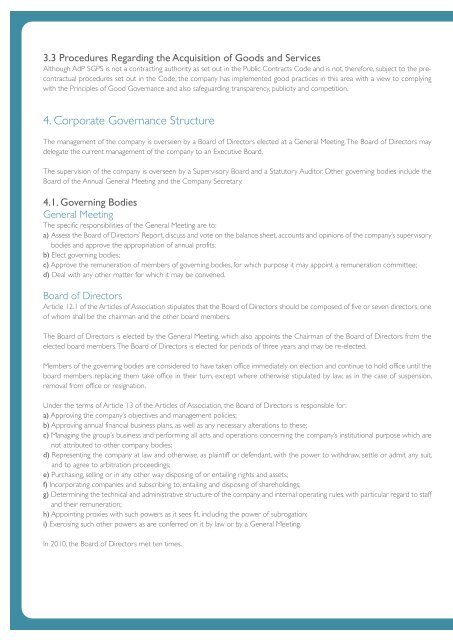Annual Report 2010 - AdP
Annual Report 2010 - AdP
Annual Report 2010 - AdP
Create successful ePaper yourself
Turn your PDF publications into a flip-book with our unique Google optimized e-Paper software.
3.3 Procedures Regarding the Acquisition of Goods and Services<br />
Although <strong>AdP</strong> SGPS is not a contracting authority as set out in the Public Contracts Code and is not, therefore, subject to the precontractual<br />
procedures set out in the Code, the company has implemented good practices in this area with a view to complying<br />
with the Principles of Good Governance and also safeguarding transparency, publicity and competition.<br />
4. Corporate Governance Structure<br />
The management of the company is overseen by a Board of Directors elected at a General Meeting. The Board of Directors may<br />
delegate the current management of the company to an Executive Board.<br />
The supervision of the company is overseen by a Supervisory Board and a Statutory Auditor. Other governing bodies include the<br />
Board of the <strong>Annual</strong> General Meeting and the Company Secretary.<br />
4.1. Governing Bodies<br />
General Meeting<br />
The specific responsibilities of the General Meeting are to:<br />
a) Assess the Board of Directors’ <strong>Report</strong>, discuss and vote on the balance sheet, accounts and opinions of the company’s supervisory<br />
bodies and approve the appropriation of annual profits;<br />
b) Elect governing bodies;<br />
c) Approve the remuneration of members of governing bodies, for which purpose it may appoint a remuneration committee;<br />
d) Deal with any other matter for which it may be convened.<br />
Board of Directors<br />
Article 12.1 of the Articles of Association stipulates that the Board of Directors should be composed of five or seven directors, one<br />
of whom shall be the chairman and the other board members.<br />
The Board of Directors is elected by the General Meeting, which also appoints the Chairman of the Board of Directors from the<br />
elected board members. The Board of Directors is elected for periods of three years and may be re-elected.<br />
Members of the governing bodies are considered to have taken office immediately on election and continue to hold office until the<br />
board members replacing them take office in their turn, except where otherwise stipulated by law, as in the case of suspension,<br />
removal from office or resignation.<br />
Under the terms of Article 13 of the Articles of Association, the Board of Directors is responsible for:<br />
a) Approving the company’s objectives and management policies;<br />
b) Approving annual financial business plans, as well as any necessary alterations to these;<br />
c) Managing the group’s business and performing all acts and operations concerning the company’s institutional purpose which are<br />
not attributed to other company bodies;<br />
d) Representing the company at law and otherwise, as plaintiff or defendant, with the power to withdraw, settle or admit any suit,<br />
and to agree to arbitration proceedings;<br />
e) Purchasing, selling or in any other way disposing of or entailing rights and assets;<br />
f) Incorporating companies and subscribing to, entailing and disposing of shareholdings;<br />
g) Determining the technical and administrative structure of the company and internal operating rules, with particular regard to staff<br />
and their remuneration;<br />
h) Appointing proxies with such powers as it sees fit, including the power of subrogation;<br />
i) Exercising such other powers as are conferred on it by law or by a General Meeting.<br />
In <strong>2010</strong>, the Board of Directors met ten times.


